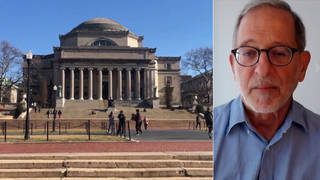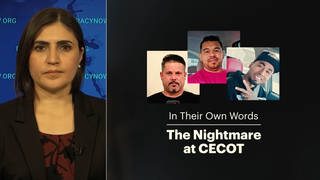
Guests
- Dana Berlinersenior attorney at the Institute for Justice. She represented the homeowners in Kelo v. New London, in which the US Supreme Court ruled that cities could condemn property because other uses may produce an increase in tax dollars and jobs.
- Michael Cristofaroresident of New London, Connecticut, who lost his home in 2006 to eminent domain.
Homeowners in New London, Connecticut took on the city’s leaders after they announced plans to condemn all of the homes in one neighborhood to make way for a private development project for pharmaceutical giant Pfizer. The city said it would bring in thousands of jobs. After a 2005 Supreme Court ruling against the homeowners, the entire neighborhood was bulldozed. This week Pfizer announced it is shutting down its research center. [includes rush transcript]
Transcript
JUAN GONZALEZ: We turn now to New London, Connecticut, the site of one of the nation’s most disputed eminent domain cases. In the 1990s, the city’s leaders announced plans to condemn and seize all of the homes in the New London neighborhood of Fort Trumbull to make way for a new private development project, which was to include a hotel, office buildings, retail shops and restaurants.
The proposed $75 million project was part of the city’s efforts to spruce up the area for pharmaceutical giant Pfizer, which had agreed to construct a $300 million research facility adjacent to Fort Trumbull. The city claimed the project would create 3,000 jobs.
Several homeowners refused to give up their homes, and their case made it all the way to the Supreme Court. In June, 2005, the court ruled by a 5-4 majority that New London’s seizure of the homes for private development was a permissible “public purpose.” The decision, Kelo v. New London, infuriated millions of property rights advocates across the country.
After the decision, the neighborhood was bulldozed.
AMY GOODMAN: The case is back in the news this week. Pfizer has just announced it’s shutting down its research center in New London and shifting 1,500 jobs to the nearby town of Groton. New London’s plans to develop the area around the Pfizer plant appear to have been abandoned, as well. The lots where families once lived are now empty, covered with weeds.
We’re joined by two guests. Michael Cristofaro joins us on the phone from New London. He lost his home in 2006, when it was seized by the city of New London. And Dana Berliner joins us in Washington. She’s a senior attorney at the Institute for Justice. She represented the homeowners in the case Kelo v. New London.
Let’s begin with Dana Berliner. Talk about the significance of this case right now.
DANA BERLINER: Well, what happened was New London entered into an incredibly risky speculative real estate deal. And like many risky speculative real estate deals, it didn’t work out. Now, if they had — if a private person did that, we wouldn’t be here today discussing it. The problem was that New London did it with tens of millions of dollars of taxpayer money and while violating other people’s rights and throwing them out of their homes for it. What this all tells us is eminent domain should not be used for private development projects.
JUAN GONZALEZ: Well, Michael Cristofaro, I’d like to ask, your reaction when you heard the news that Pfizer was pulling out? Apparently, they didn’t even give any advanced notification to the town leaders of New London that this was happening. And could you talk about your reaction?
MICHAEL CRISTOFARO: Well, you know, the town leaders say they didn’t have a clue on this, but they actually did. They knew what was going on. They just don’t want to admit it.
But when I heard the news, it really felt like someone was basically stabbing me in my heart, because it was like reliving the whole thing all over again, that we lost our homes for nothing. And that’s what it was about. I mean, it’s a brownfield. And when someone comes in and says, “You need to give up your home for the betterment of the community,” and they have this plan that’s basically based around Pfizer’s, and all of a sudden Pfizer comes in and tells them, “Hey, we’re leaving the area,” and there’s eighty acres now sitting there empty, I’m extremely hurt.
AMY GOODMAN: I want to play a short video featuring the investigative journalist Jeff Benedict and New London homeowner Suzette Kelo. Jeff Benedict is the author of the book Little Pink House: A True Story of Defiance and Courage.
JEFF BENEDICT: We’re entering the Fort Trumbull neighborhood, which used to be a thriving neighborhood in New London, Connecticut. It was named after the historic Fort Trumbull from the Revolutionary War period that Benedict Arnold burned down. And it was an immigrant neighborhood of mostly Italian families. And this stretch right here, where all these weeds are now sprouting up, used to be homes — senior citizens, kids, working middle-class families.
In 2005, the United States Supreme Court issued a decision called Kelo v. New London. It’s probably the most controversial court decision since Roe v. Wade. The difference was, this time almost everyone in America was on one side: everybody thought it was wrong. And that decision stemmed from a fight, a street fight, really, that took place in this neighborhood over a seven-year period between a small group of neighbors who fought against the city of New London, who wanted to take their neighborhood away. But the fight was led by a nurse, a woman who had been living in this neighborhood for the shortest amount of time. Her name is Suzette Kelo.
SUZETTE KELO: This started when people who thought they were better than us drove through the Fort and looked at the view and said, “What a beautiful view! What are these scumbags doing living here?”
JEFF BENEDICT: The decision stood for the idea that government, local government or state government, can take people’s private land or private homes and turn it over to a private developer for private development or private gain.
SUZETTE KELO: I came home from work on the Wednesday before Thanksgiving, and on the front of my door was an envelope with condemnation papers taped to my front door.
JEFF BENEDICT: All these homes and buildings have seen the wrecking ball in the last couple years.
SUZETTE KELO: From me — not necessarily just me, but from all of us — man, they ripped our hearts out. What? Are you kidding me? I mean, that’s what they did to us. They took everything away from us.
AMY GOODMAN: That excerpt describing what happened in New London. Can you follow up, Michael Cristofaro, this news, the week of Pfizer leaving, actually going where Ms. Kelo went, moved, to Groton, Connecticut. Who knows if her home will be condemned again? But the fact that they had gotten a tax abatement for ten years, they were there for all that time, and as that tax abatement is up, they are leaving, and your home is bulldozed.
MICHAEL CRISTOFARO: Well, I mean, that hurts even more, because, you know, the state and the city — you know, Pfizer came in. They said what they would like to see happen, you know, to the neighborhood. And they had executives who basically said they didn’t want to look out their tenements down at — I mean, look out their windows down at these tenements and, you know, “We would like to have a biotech buildings and office park there.” And so, that’s what the city did. They accommodated them. And they gave them all these tax breaks.
And the hopes and dreams were that this Pfizer Global Research Center was going to draw all these major corporations into New London, and it was going to save them, you know, by increasing the tax rolls. And here it is, ten years later, they actually extended tax abatements an additional three years to entice Pfizer to come here. And here it is, the tenth year, and the tax abatements are finally up, and they turn around and drop this bombshell, saying, “We are leaving.”
JUAN GONZALEZ: Well, Dana Berliner, I’d like to ask you — the fight of the homeowners in New London really became a national cause, and as a result of the furor over the Supreme Court decision, many states began changing their own laws. Could you talk about the movement that developed after the decision?
DANA BERLINER: Absolutely. What happened after the decision was an overwhelming tidal wave of outrage on the part of just really practically everyone in the country, except for city governments and developers and planners. Everybody hated it. The poll numbers ran somewhere between the high 80s and the high 90s, in terms of disliking the decision and disliking what happened. It crossed all political lines.
And forty-three states changed their laws, and most of those made really serious changes to stop eminent domain for private development. Connecticut, however, passed a law that didn’t do anything at all. It passed a law that wouldn’t have even stopped this taking. And there are a few states that have done absolutely nothing, which means that many home and business owners throughout the country still are at risk for exactly this kind of eminent domain abuse.
JUAN GONZALEZ: Michael Cristofaro, we have right here — New York has not done much in this respect, and we have two huge projects right here in New York City: the Atlantic Yards project in Brooklyn and the Willets Point development project in Queens, both of which the local government is trying to use eminent domain to force out homeowners and businesses. I’m wondering what counsel or advise you have for those people in those neighborhoods that are continuing to fight this effort?
MICHAEL CRISTOFARO: Well, I’m hoping that with this news of Pfizer’s pulling out of New London and leaving New London basically in a hole, that, you know, New York will now look at this and say, “You know what? Economic envelopment and eminent domain does not work, period.”
And as far as those property owners, continue to fight. Fight. You know, stay in your homes, businesses, until the very end. Do not let them take you out of your homes. I mean, this is a wrong decision. And those justices, those five justices, were wrong. And this needs to be revisited, and all of our rights need to be protected again.
JUAN GONZALEZ: And, of course, one of the justices in that 5-4 majority was David Souter, who’s no longer on the court, has been replaced by Justice Sonia Sotomayor. Dana Berliner, any sense from the hearings that were held for Judge Sotomayor’s confirmation whether you have hope that if this — if a similar eminent domain case comes before the Supreme Court again, that she might cast a vote the other way?
DANA BERLINER: I don’t think there was anything in the hearings that would tell us that. I’m hoping, though, that what has happened since will have an effect on the court. The court’s decision basically said, “If the city’s got a plan, then we’ll just trust that they know what they’re doing. We won’t look at it.” And it was evident, even at the time, that this project was going to fail. And we showed that, and the court said they didn’t want to hear about it. I’m hoping that now, the next time they look at it, they’ll realize cities don’t know what they’re doing. They don’t know how to engage in risky real estate deals. And this is not the kind of thing that we should be using, eminent domain, in order to allow private companies to make a greater profit.
AMY GOODMAN: We want to thank you very much for being with us, Dana Berliner, senior attorney at the Institute for Justice — she represented the homeowners in the Kelo v. New London case — and Michael Cristofaro, resident of New London, Connecticut, who lost his home in 2006 to eminent domain. Those lots, those properties, those houses remain bulldozed today. And you can go to our website at democracynow.org, where we link to Juan Gonzalez’s piece today in the New York Daily News on eminent domain.













Media Options